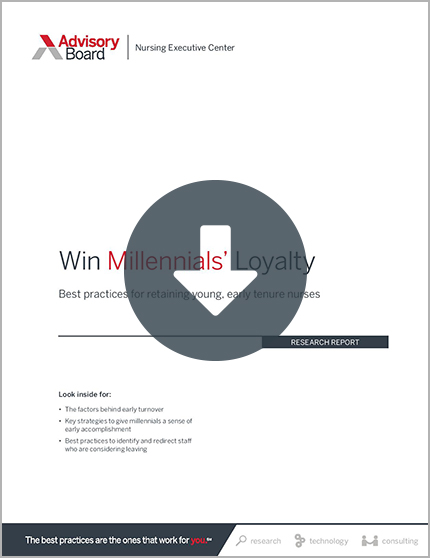Auto logout in seconds.
Continue LogoutResearch shows that a number of young adults are choosing to seek care from telemedicine providers, retail clinics, and urgent care facilities instead of primary care providers (PCPs)—and some PCPs are looking to win back millennial patients by offering more convenience.
New report: 10 imperatives for primary care today
Traditionally, patients who faced delays seeing their PCPs or sought after-hours medical care have turned to ED for non-emergency conditions. But long wait times and costly ED bills has helped drive a proliferation in alternatives for providing primary care, such as telemedicine, retail clinics, and urgent care facilities. According to RAND, there currently are more than 2,700 retail clinics in the United States.
Millennials shift from PCPs to alternative sources of care
Oct. 24 webconference
Benchmark your primary care access performanceWhile these alternative sources of care were not intended to replace PCPs, recent surveys suggest millennials increasingly are willing to ditch PCPs and are driving a broader shift toward non-PCP care, KHN reports.
For example, a recent Kaiser Family Foundation poll found fewer adults ages 18 to 29 had a PCP when compared with older adults. In particular, the poll found:
- 45% of adults ages 18 to 29 did not have a PCP;
- 28% of adults ages 30 to 49 did not have a PCP;
- 18% of adults ages 50 to 64 did not have a PCP; and
- 12% of adults ages 65 and older did not have a PCP.
A 2017 survey by the Employee Benefit Research Institute found similar results. The survey found 33% of millennials did not have a regular physician, compared with 15% of adults ages 50 to 64.
Ateev Mehrotra, an internist and associate professor at Harvard Medical School, said, "I think people's expectations have changed. Convenience [is prized] in almost every aspect of our lives." Mehrotra explained that younger adults are not willing to wait several days to see a PCP for an acute condition—a practice that was common in the past. "Now, people say, 'That's crazy, why would I wait that long?'" Mehrotra said.
Experts stress the need for PCPs
But some experts argue that millennials' shift away from PCPs means they are not getting the most effective care. PCPs for decades have been the physicians with whom patients have developed the closest relationships, and PCPs have helped coordinate their patients' care—advising patients on treatment options, making referrals to specialists, and ordering tests.
Michael Munger, president of the American Academy of Family Physicians, said, "We all need care that is coordinated and longitudinal. Regardless of how healthy you are, you need someone who knows you."
Nitin Damle, an internist and an associate clinical professor of medicine at Brown University, stressed that young adults can develop certain medical conditions, such as diabetes and hypertension, that require care coordination. PCPs "know who the best and most appropriate specialists in the area are. We know who to go to for asthma, allergies, inflammatory bowel disease," Damle said.
How PCPs are trying to win back millennials
Some PCPs are taking steps to attract and retain millennials by offering patients more convenience, KHN reports.
For example, some PCPs are hiring more physicians and nurse practitioners to reduce the amount of time patients must wait to see a provider.
In addition, some PCPs are launching digital tools that patients can use to communicate with their physicians, as well as tools that allow patients to schedule video visits or make appointments using their mobile devices.
To accommodate their millennial patients, Blair said his practice began offering same-day appointments. He added that he and his PCP partners "do far more messaging and interaction through electronic interface. I think millennials expect that kind of connectivity" (Boodman, Kaiser Health News/Washington Post, 10/6; Vartorella, Becker's Hospital Review, 10/8; Baker, "Vitals," Axios, 10/9).
Millennials 101: What they want from their jobs, their PCPs, and more
Millennials are now the largest living generation—which means they're poised to become the backbone of your workforce and top utilizers of everything from primary care to maternity services to virtual visits. To help you understand this generation, we've collected some of our best resources on millennials.
Don't miss out on the latest Advisory Board insights
Create your free account to access 1 resource, including the latest research and webinars.
Want access without creating an account?
You have 1 free members-only resource remaining this month.
1 free members-only resources remaining
1 free members-only resources remaining
You've reached your limit of free insights
Become a member to access all of Advisory Board's resources, events, and experts
Never miss out on the latest innovative health care content tailored to you.
Benefits include:
You've reached your limit of free insights
Become a member to access all of Advisory Board's resources, events, and experts
Never miss out on the latest innovative health care content tailored to you.
Benefits include:
This content is available through your Curated Research partnership with Advisory Board. Click on ‘view this resource’ to read the full piece
Email ask@advisory.com to learn more
Click on ‘Become a Member’ to learn about the benefits of a Full-Access partnership with Advisory Board
Never miss out on the latest innovative health care content tailored to you.
Benefits Include:
This is for members only. Learn more.
Click on ‘Become a Member’ to learn about the benefits of a Full-Access partnership with Advisory Board
Never miss out on the latest innovative health care content tailored to you.

